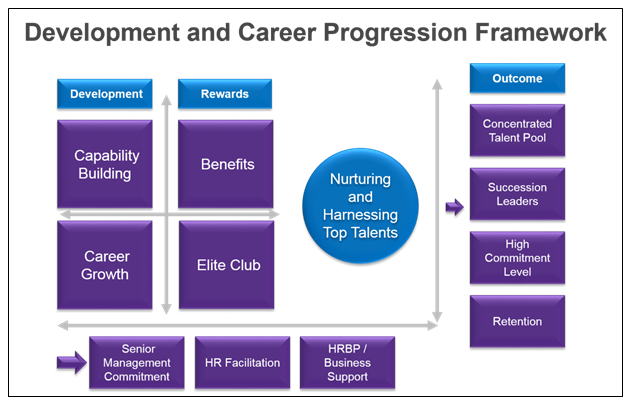Capability Development and its impact on employee & organization success

In the forever-evolving technology industry, driven by innovation and plagued by attrition, there is a constant and increasing demand for top talent challenging the capabilities of Talent Acquisition teams. This necessitates organizations to optimize available internal talent and focus on Employee Capability Development programs that address the scarcity of top talent and serves as a retention tool at the same time.
A well designed Capability Development program, when leveraged fully and made integral to the DNA of an organization leads to:
- creating a culture of continuous learning
- enabling agility with market-ready skill sets
- reducing time and cost of recruitment
- ensuring an engaged workforce
While such programs may vary in their construct from organization to organization, a top-down approach is a pre-requisite for all. A successful Capability Development Program requires conviction, commitment, and confidence of the leadership in inculcating a culture of learning to become a sustainable initiative.
One must also bear in mind that the lifespan of such programs is generally a maximum of 3 years – thereafter it invariably requires an assessment for change or an update that may arise from an organization’s strategic and business direction. Such audits and updates ensure the Capability Development Program objectives are aligned to the business objectives and meeting the employee development needs.
Once the objectives are set, there are several ways in which to make it a success – here are 3 key tried and tested measures to build a sustainable Capability Development Model.
# 1. Ensuring employee involvement:
Creating opportunities for employee participation from design to implementation has a huge impact on the success of the program – fostering a sense of co-ownership between the organization and the individual, and drives the acceptance levels of the program amongst its core target audience.
# 2. Fueling the organization’s career growth framework:
Once a Capability Development program becomes integral to the organization, it can also collaborate with Career Progression Framework - empowering employees in driving their career growth through upskilling and acquiring next level proficiencies.

Next level skills as laid out by the Career Progression Framework, can form the basis for skill gaps assessment through the Capability Development Program tools. This leads to ways in which the organization can enable the individual to achieve his or her career goals through:
- Enabling IDP (Individual Development Plan) that helps the employee overcome skill gaps through assessment tools, empowering them to plan a customized program including opportunities to upskill or cross skill as decided and driven by themselves.
- Facilitating the mandatory minimum basic proficiencies at all levels through online LMS Tools, and internal programs like Hackathons, Technical Forums, Knowledge Sharing Sessions, etc.
- Sponsoring external certifications and tie-ups with academic institutions for higher education.
It is equally important that Organizations recognize and celebrate the accomplishments of employees who successfully achieve their IDP goals, setting an example of the organization’s commitment to individual growth – which goes a long way in motivating and in retention.
# 3. Including human intervention:
Coaching is particularly relevant when employees are in an integrated Techno-Functional role. The interaction between the Coach and the Coachee facilitates a deeper understanding of the focus areas required for effective on-the-job performance. This also aids in achieving IDP goals. Coaching can be a valuable investment especially in building succession lines and a strong senior management team by addressing psychological, emotional and behavioral areas that are difficult to address in classroom environments.
To summarize, organizations with a clearly outlined capability model and a commitment to employee development, foster loyalty and enhances employer branding that plays a critical role in developing talent and curbing attrition – a win-win for both, the individual and the organization.













